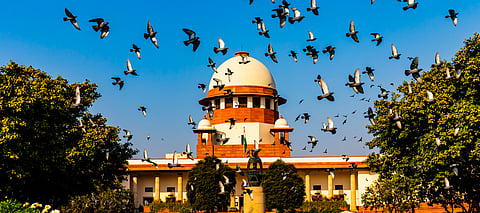

THE Supreme Court Friday issued notice to the Central Government on a Public Interest Litigation (PIL) seeking suitable guidelines to investigative agencies in respect of seizure, examination, and preservation of digital and electronic devices and their contents.
A bench led by Justice Sanjay Kishan Kaul issued notice to the Centre while hearing a PIL filed by renowned academicians Ram Ramaswamy, Sujata Patel, M. Madhava Prasad, Mukul Kesavan and Deepak Malghan. It said it would consider issuing notice to all states after considering the stand of the Centre.
The plea contended that there were no specific and binding norms to guide the exercise of such power and no procedure in any law or even in most police manuals that was appropriate to the recovery of electronic or digital material, which was distinct from the recovery of any other kind of material.
"They contain an entire professional and personal world, most of which is no concern of any investigation. Data is amenable to easy change and to remote tampering. Yet, in the course of investigation, digital devices such as laptops and phones are seized simply as material objects, and the many matters of professional and personal importance they contain are compromised at the hands of state agencies", the plea stated.
The plea urged that the Court could consider the following safeguards: requirement of a prior warrant from a Magistrate except in cases of utmost urgency and in both cases, recording of the nature of material sought and its necessity to the investigation, passwords or unlocking of devices in cases of biometric encryption should not be compelled, noting of hash value in the seizure memo, ideally, copy of hard drive should be taken, not the original, else copy to be given to owner/representative at the time of seizure, examination of device in owner/representative's presence, removal of material irrelevant to investigation from the investigator's copy, and other measures thought fit and proper.
It added that the entirely unguided power exercised by investigative agencies to take control of personal digital devices that contain much if not all of a citizen's personal and professional life, requires to be civilised by way of directives from the Court.
The plea went on to say that there is no procedural mechanism to sift the contents of devices and protect that which is irrelevant to an investigation, but important to the owner of the device.
"Suitable measures need to be evolved in light of the nine-judge bench decision in Justice (Retd.) KS Puttaswamy v Union of India", the plea stated.
It thus sought directions from the Court to the effect that the search and seizure done by investigative agencies of digital devices is by a procedure that safeguards: (i) the right to privacy; (ii) the right against self-incrimination; (iii) the need for the State to demonstrate necessity and proportionality in respect of its action impacting those rights; (iv) privileged communication and material; (v) confidentiality of professional work; (vi) return of seized material so as to not hamper professional work; (vii) integrity of digital evidence during and post-search/seizure.
Senior advocate Nitya Ramakrishnan assisted by advocate Prasanna S appeared for the petitioners.